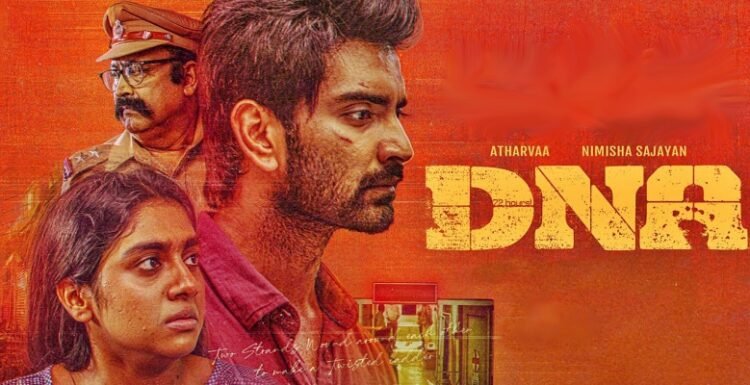Director Nelson Venkatesan is acclaimed for films like Oru Naal Koothu, Monster, and Farhana. He now returns with his latest project, DNA, which tells the story of Divya and Anand, a couple united by fate who face a harrowing situation with the birth of their first child.
Story
The film begins with Anand, a distraught individual struggling with addiction and feelings of rejection, alongside Divya, a woman coping with borderline personality disorder (BPD). Both are perceived as burdens by their families. However, destiny leads them to marry each other, and instead of spiraling further downwards, their relationship becomes the catalyst for their transformation. The joy of welcoming their baby quickly turns to distress as Divya realizes the infant she is given is not hers. Her frantic pleas for help are dismissed as hallucinations, leading to a tense and complex investigation that tests Anand’s limits.
Performances
Atharvaa delivers one of his career-best performances, skillfully portraying Anand’s emotional journey—from heartbroken lover to reluctant spouse, and ultimately, determined father. He artfully balances vulnerability and anger, particularly in the emotionally charged climax. Nimisha Sajayan shines as Divya with a powerful and convincing presence, exuding a subtle intensity that evokes deep empathy for her character. Together, their chemistry enriches the film’s emotional depth.
Supporting roles, especially Balaji Sakthivel as the weary yet earnest Sub-Inspector Chinnasamy, add substantial weight to the narrative.
Behind the scenes
On a technical level, DNA excels. Parthiban’s cinematography enhances the mood and tension, particularly during night scenes. Ghibran’s background score amplifies the suspense, while Sabu Joseph’s editing maintains a tight narrative flow. There is a noticeable focus on Anand’s action sequences, some of which could have been shortened, as the core of the story revolves around the quest for the missing baby rather than showcasing heroics.
From a craftsmanship standpoint, the most significant shortcomings lie in the soundtrack; certain songs seem extraneous and disrupt the film’s overall tone.
Final Verdict
Ultimately, what hinders DNA is the absence of a convincing emotional bond between Anand and Divya. This vital aspect feels underexplored. Divya’s BPD, introduced early on, has minimal influence on the plot as it unfolds, and their relationship is largely conveyed through a song, with the narrative quickly jumping ahead to their life as new parents. This rapid pace leaves the audience with insufficient time to connect with their relationship, diminishing the impact of the central mystery.
The film’s strongest elements reside in its intriguing mystery and its flirtation with darker themes, yet it falls short of delving into the emotional and psychological complexities it hints at. By hastening through the couple’s relationship and relying on familiar genre tropes, it misses the opportunity to create a truly layered thriller.
The pacing stumbles slightly in the second half as the film shifts to a more investigative tone, causing it to lose some of the emotional resonance established earlier. Nevertheless, Nelson expertly navigates the story back on course, leading to a climax that is both intense and cathartic.
While DNA keeps viewers engaged with its investigation and the unsettling realities it reveals, the absence of a fully developed relationship at its center reduces its emotional impact. It presents a captivating premise, evoking lingering thoughts, yet one cannot help but wish the film had explored deeper themes.
Currently available for streaming on JioHotstar, DNA was also released in Telugu on Friday, July 18, under the title My Baby. For those seeking an intriguing and emotionally resonant film to watch with family, it is a solid choice for the weekend.























